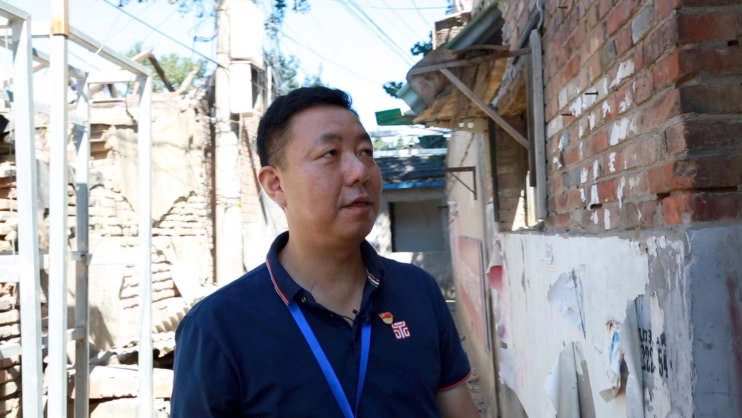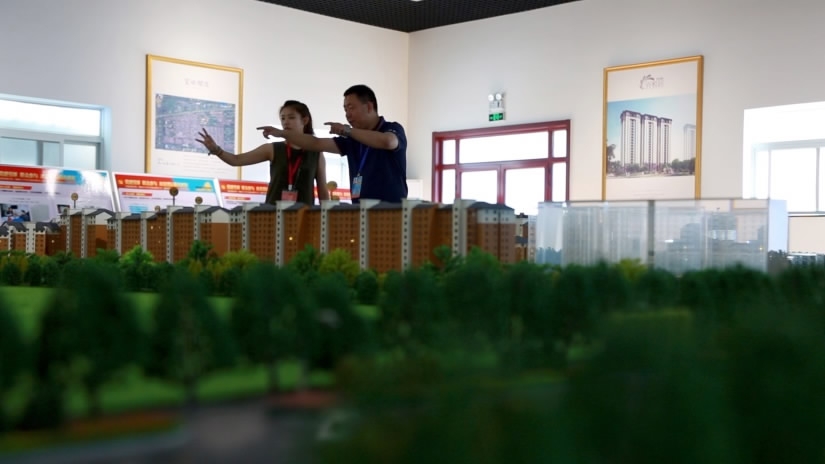
China
15:34, 04-Oct-2017
Ask China: A Day with Housing Mediator
CGTN

China’s housing problem is particularly serious in major metropolitan areas, especially for those who live in the shantytowns that lie in the shadows of shining skyscrapers and shopping malls.
Chen Weibing, secretary of the CPC Committee of the Yongwai Sub-District, joined the Communist Party of China (CPC) in 1993. CGTN spent a day with the experienced Party member as he assumes his responsibilities in making sure that low-income families agree to replacement housing and will move into better-equipped residential environments.

CGTN
CGTN
Located just outside the south 2nd Ring Road in downtown Beijing, Wangtan literally means a place where can see the Temple of Heaven – one of the capital’s ancient landmarks – from afar.
According to reports, most of the buildings in the area were constructed in the 1950s. Without proper maintenance or repair during the past few decades, the area has become rife with hidden dangers, and suffered from a dirty environment and inconvenient traffic – many small alleys can’t handle automobile traffic and even pedicabs cannot go in and out.

CGTN
CGTN
This shantytown, located just a few miles from the city center, is Beijing’s largest and rumors of relocation plans had been in the air for about 24 years, until last year when they finally came into fruition following an estimated total capital investment of some 43 billion yuan (about six billion US dollars).
More than 5,700 households lived in the area, among whom, over 98 percent have agreed to relocate, making it the highest rate ever reached within a three- to four-month period.

CGTN
CGTN
In a giant project like this, “nail households", referring to those who refuse to relocate, are usually regarded as a pain in the neck, however, Secretary Chen holds a different opinion,
“I never call them ‘nail households.’ I call them people who haven’t signed the deal. Because they all have their own difficulties. We are here to help them resolve their problems, not to be contrary.”
Secretary Chen, who named his office ‘The Family of Shantytown Renovation’ said, “I want residents feel like this is a home, a place of warmth to resolve problems. If it is called ‘Complaints and Appeal Office,’ it sounds like we are opponents.”

CGTN
CGTN
At the same time, residents of the shantytown are thankful for Secretary Chen and his colleagues’ work, and look forward to the renovation.
“Secretary Chen came to our houses every day to explain the policies to us. We will be compensated with an apartment that has twin bedrooms. My husband and I can have a room, and my child could sleep in the other one,” 65-year-old resident Zhang Shiru said.
75-year-old Wang Jinsheng said, “I am really happy that I can move into a new apartment at 80 years old. I used to live in a room of 14-square-meters, while the new room is more than 70! It is great! I am grateful to the government and to the Party.”

CGTN
CGTN
Meanwhile, Secretary Chen admits that it is not easy to do community work, as situations differ from home to home, but he is confident that the remaining 89 families who haven’t signed the deal will eventually agree to move.
“We are familiar with each and every family in the neighborhood, which is the basis for our daily job. It requires skill. For example, you should know who to speak to, when, and what the most effective way to talk with the residents is.”
He goes on, “It is essential to speak to the residents with facts in order to earn their trust. We need to tell them that the Party and the government is trying to help fix their difficulties. It is not a simple development project, it is in the residents’ interests to improve their livelihood. If they understand that, they will accept the deal.”

CGTN
CGTN
Even as residents move out from the area, Secretary Chen’s role in the project continues, as he will keep helping the neighborhood, such as by communicating with the residents through social media and providing necessary aid, making sure that everybody still feels like they are part of the community.
Shantytown renovation has been highlighted in Chinese authorities’ agenda. During the next three years, China plans to dismantle 15 million shantytown homes, in an aim to improve living conditions of the people.

SITEMAP
Copyright © 2018 CGTN. Beijing ICP prepared NO.16065310-3
Copyright © 2018 CGTN. Beijing ICP prepared NO.16065310-3